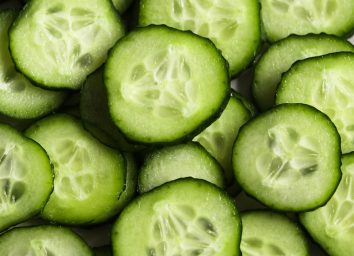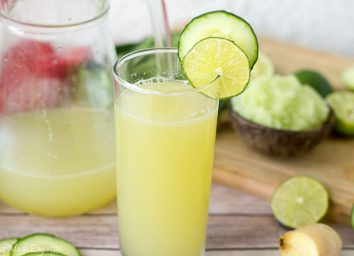8 Science-Backed Benefits of Eating Cucumbers
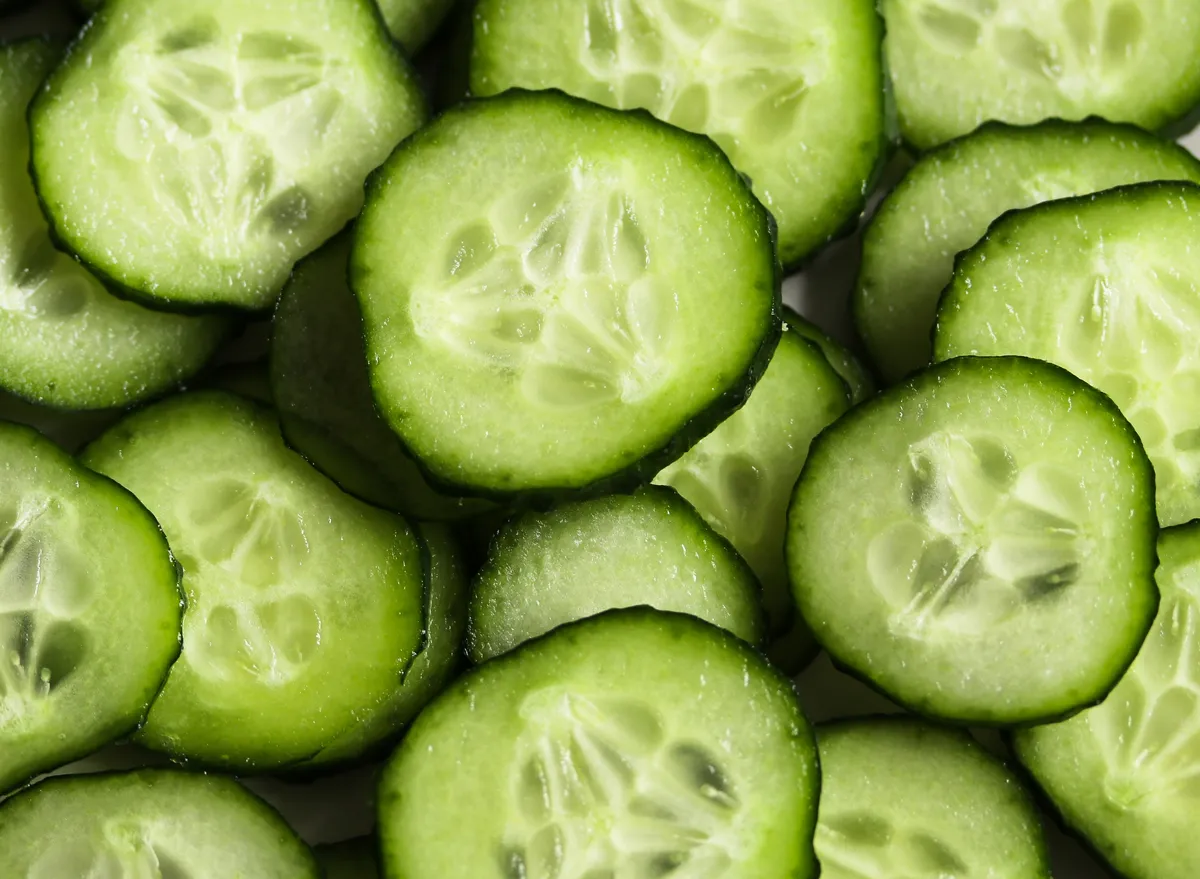
As you crunch on the cucumbers in your salad, dip slices of them in hummus, or even prepare yourself a refreshing glass of crisp cucumber water as if you’re taking a spa day, you might not realize the extent to which the benefits associated with eating cucumbers truly affects your body.
In fact, there are numerous science-backed reasons why eating cucumbers can help optimize your health—some of which you may not even realize and will likely find surprising.
Either way you slice it, knowledge is power. So to help you better understand the impact of eating this tasty fruit (fun fact: cucumber is technically a fruit, not a vegetable), here are eight science-supported benefits of eating cucumbers. And for more info about the effects of your favorite produce, be sure to check out Are Apples Good for You? Here Are 9 Science-Backed Benefits.
Eating cucumbers supports bone health.
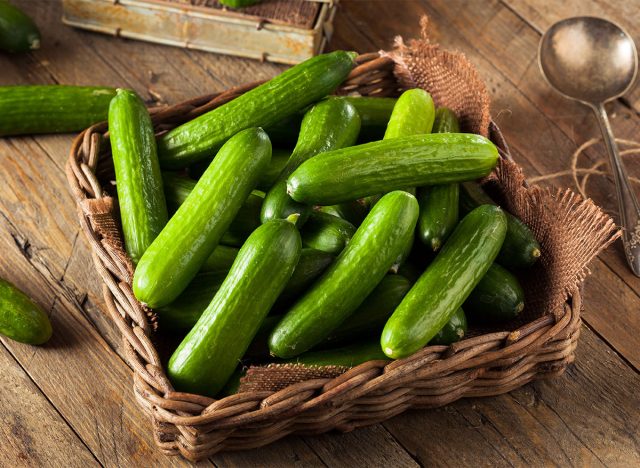
Cucumbers are a nutrient-dense, low-calorie fruit (masquerading as a veggie to most). One vitamin cucumbers are loaded with is vitamin K, which aids in building and fortifying strong, healthy bones, according to research. There are about 50 micrograms of vitamin K in a single cuke. This may not seem like much, but that actually accounts for a little over 40% of your daily value (DV) of vitamin K for the day.
They can help keep your breath fresh.

“Cucumbers can help with bad breath through their water, fiber, and photochemical content,” Johna Burdeos, RD, tells Eat This, Not That! “They are made up of over 95% water, making them a hydrating food. Dry mouth is a common cause of bad breath because saliva helps wash away bacteria in the mouth,” she explains. “When you’re dehydrated, your mouth produces less saliva, which can lead to bad breath. Eating cucumbers can help hydrate the mouth, increasing saliva production and helping to wash away bacteria.”
“[Also], cucumbers contain phytochemicals, such as polyphenols and flavonoids, that have antioxidant properties,” adds Burdeos adds. “These compounds help reduce the number of bacteria in the mouth that can cause bad breath.”
Cucumbers may help lower blood your pressure.

A 2017 study showed a decrease in blood pressure after drinking cucumber juice. Though the sample size was small—just 20 participants 60 years old or older with high blood pressure—the findings were very pro-cucumber. The participants drank one cucumber blended in water twice a day for seven days. The study showed a “significant effect” of cucumber juice on lowering blood pressure in the age group. While cucumbers aren’t traditionally included in smoothies, this could be a reason to juice up a cucumber today. Cheers!
They may help stave off diabetes.
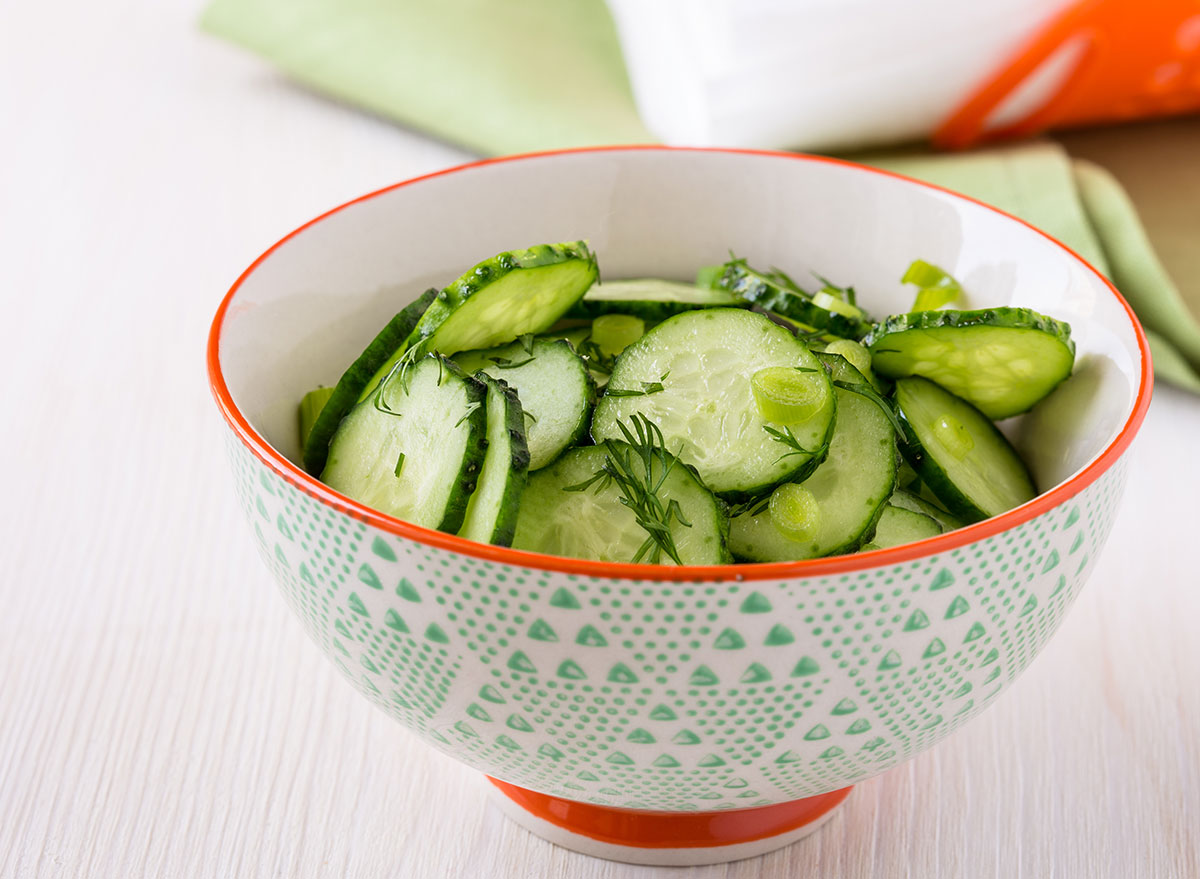
When trying to avoid diabetes, it’s best to begin fine-tuning your diet—avoid highly processed carbohydrates, skip out on sugary drinks, and limit red meat, according to Harvard Health. In addition to those dietary choices, it’s also important to start eating more foods with a low glycemic index (GI). GI is a number assigned to different foods, ranging from zero to 100. The higher the glycemic index is of a number, the more a person’s blood sugar will rise after eating it. Cucumbers have a glycemic index of 15, making it a food with a relatively low number.
Eating foods with a low GI can help reduce insulin resistance, which in turn helps reduce the risk of type 2 diabetes, according to Nutrition Journal.
They keep you hydrated.
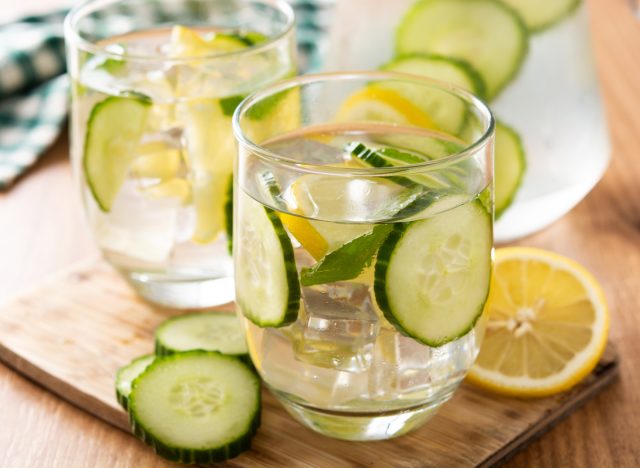
Thinking about investing in a 64-ounce water bottle? Forget about it. All you need to be more hydrated is to snack on some cucumber slices, and you’re set. Well, maybe you should still get the water bottle, and continue to drink water, but that doesn’t take away from cucumbers being a source of hydration.
According to a French and British population survey published by Nutrients, cucumbers are more than 95% water—which means that in addition to a crunchy snack, you’re also getting hydrated in the process of eating cucumbers.
“They can help contribute to your overall daily fluid intake and keep you feeling hydrated and your body functioning optimally,” says Registered Dietitian and Certified Nutrition Support Clinician Kristin Gillespie.
Eating cucumbers can help you lose weight.
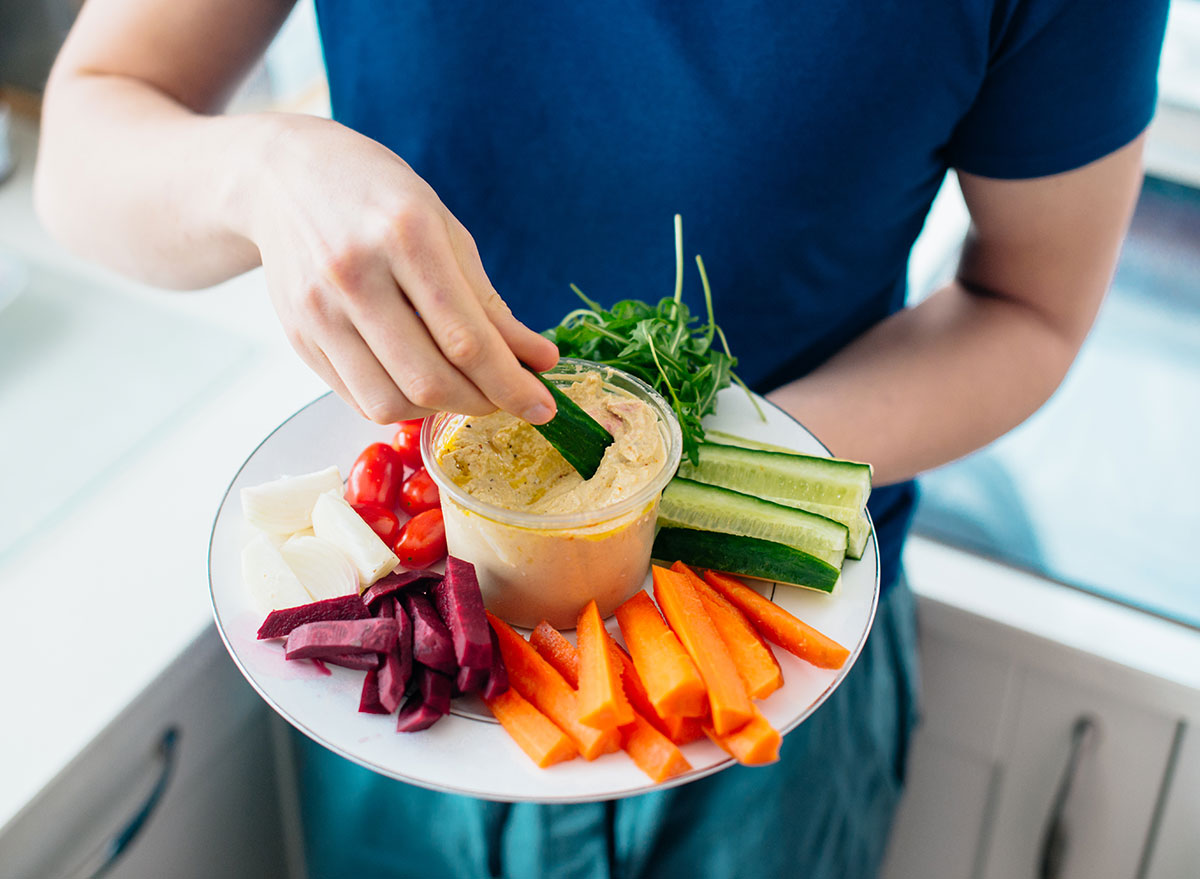
There are a number of routes that people looking to lose weight take when it comes to making adjustments to their diets. One step that should be taken is adding in cucumbers, not only because they offer a great crunch into a variety of dishes, but also because they’re a healthy food that helps to promote weight loss.
There are only 16 calories in one cup of cucumbers, which means that the food has a low energy density. According to a Nutrients study focusing on food energy density, there is a link between consuming foods with lower energy densities and weight loss.
Additionally, due to their high water content, cucumbers are extremely filling while remaining low in calories, making them a great snack for anyone looking to lose weight. Especially if you pair them with a filling healthy dip, like hummus or guacamole!
You’ll avoid constipation.
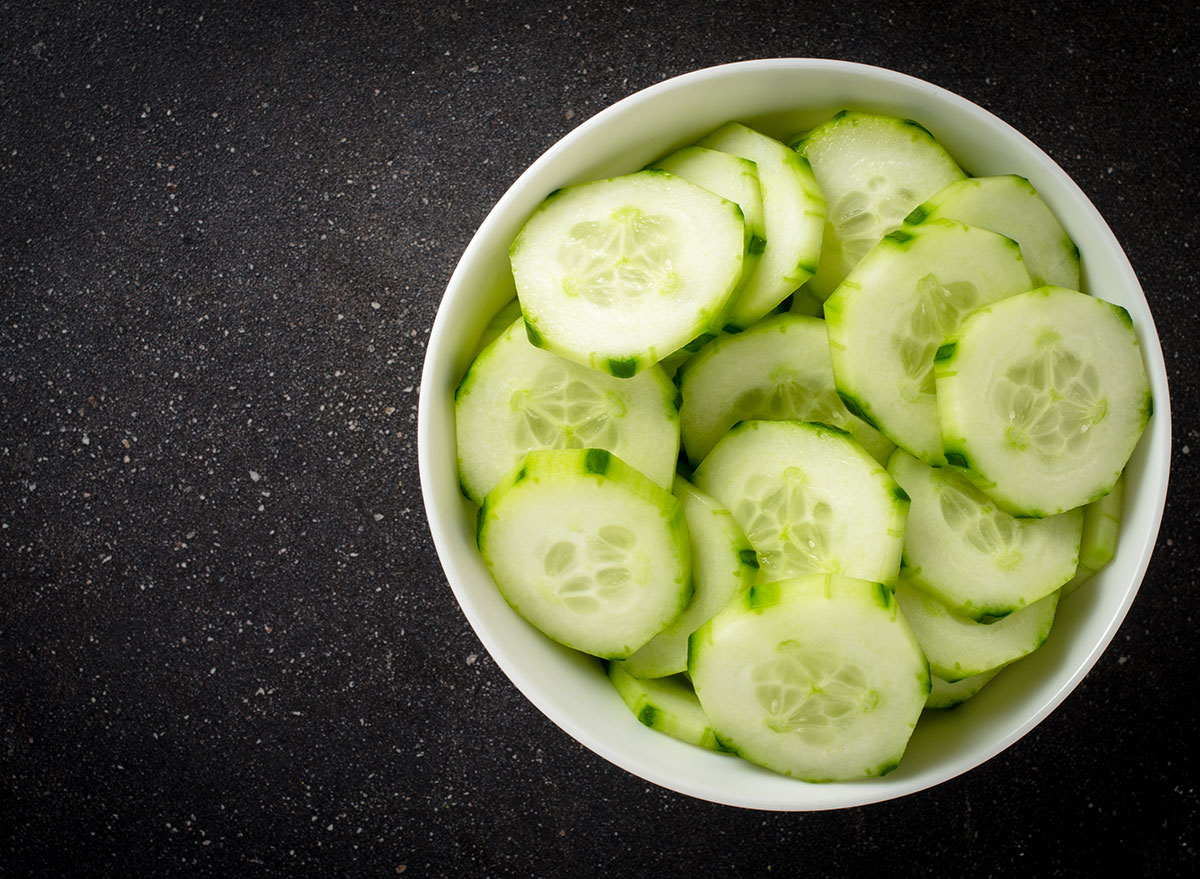
With all of the water and fiber that you find in cucumbers, is it any wonder that they help to prevent constipation? In a study published in Fitoterapia from Jadavpur University, it’s said that the seeds of the cucumber, of which there are many, help to “prevent constipation.” Additionally, they have a “cooling effect” on the body, according to the study. Pennsylvania State University’s College of Medicine recommends adding cucumbers to various dishes to help relieve constipation.
They can help mitigate bloating.
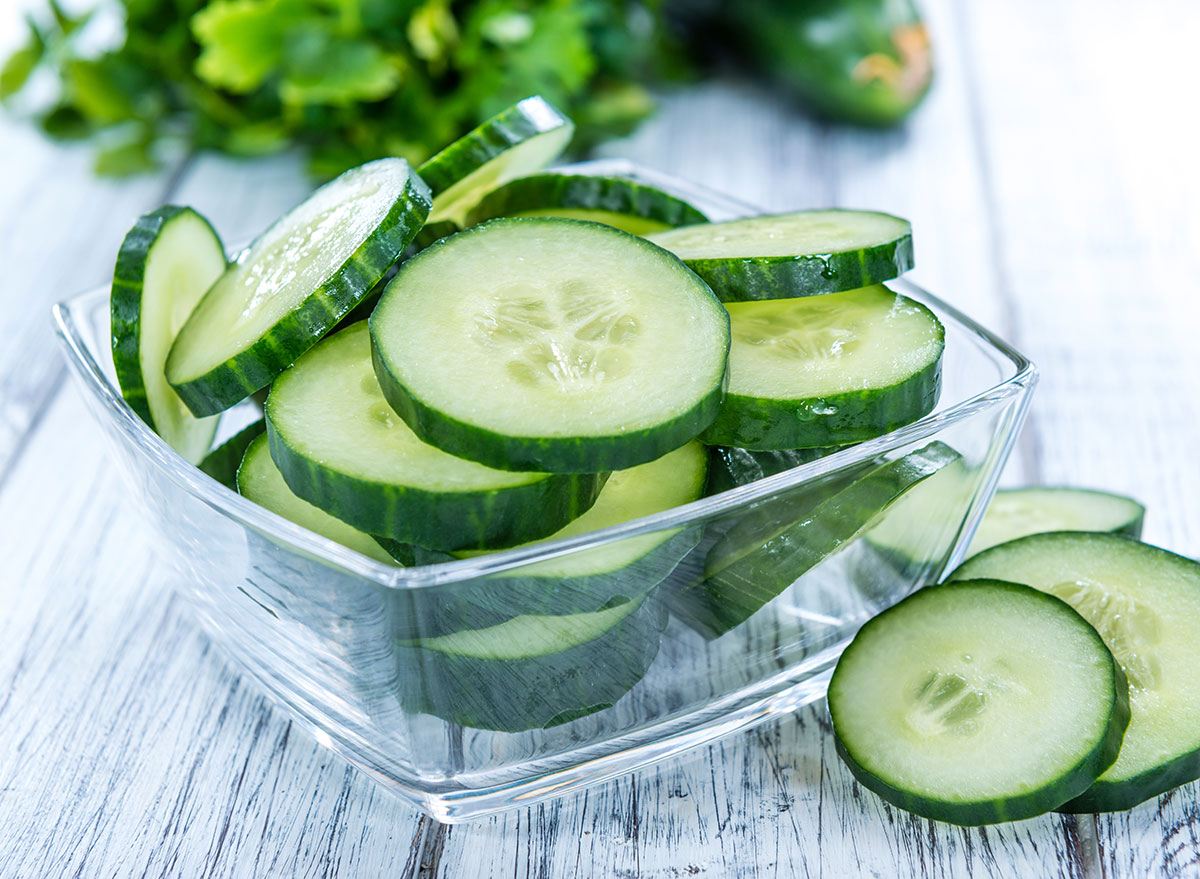
Rich in specific nutrients that help eliminate water retention and inflammation, cucumbers may be an ideal solution to help avoid bloating—and all the miserable side effects that can come along with it. This is, in part, due to their high potassium content. At 442 milligrams of potassium, one cucumber can provide you with nearly 10% of your DV of this important mineral.
“The potassium found in cucumbers may help people experience less bloat by decreasing water retention,” says Lauren Manaker, MS, RDN, registered dietitian and author of The First Time Mom’s Pregnancy Cookbook and Fueling Male Fertility. “And if people are bloated due to constipation, eating cucumbers with the skin [on] can give the body a fiber boost, which may help keep things moving a bit more smoothly, which may, in turn, help people experience less bloat.”
A previous version of this story was originally published on August 10, 2021. It has been updated to include additional copy and proofreading revisions, more research, and updated contextual links.
- Source: https://coek.info/pdf-classification-of-fruits-and-vegetables-.html
- Source: https://pubmed.ncbi.nlm.nih.gov/23098877/
- Source: https://www.hsph.harvard.edu/nutritionsource/disease-prevention/diabetes-prevention/preventing-diabetes-full-story/
- Source: https://www.ncbi.nlm.nih.gov/pmc/articles/PMC2654909/
- Source: https://www.ncbi.nlm.nih.gov/pmc/articles/PMC5084017/
- Source: https://www.ncbi.nlm.nih.gov/pmc/articles/PMC4848697/
- Source: https://www.sciencedirect.com/science/article/abs/pii/S0367326X12002791?via%3Dihub
- Source: https://research.med.psu.edu/oncology-nutrition-exercise/patient-guides/constipation/


